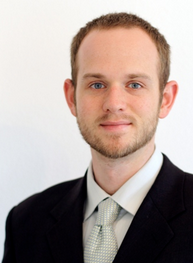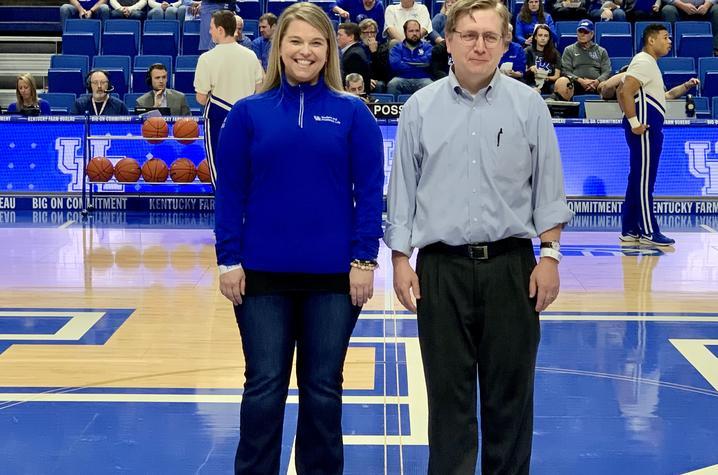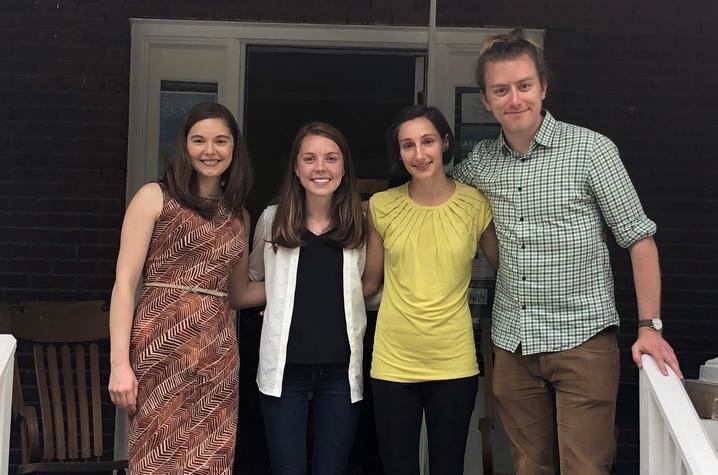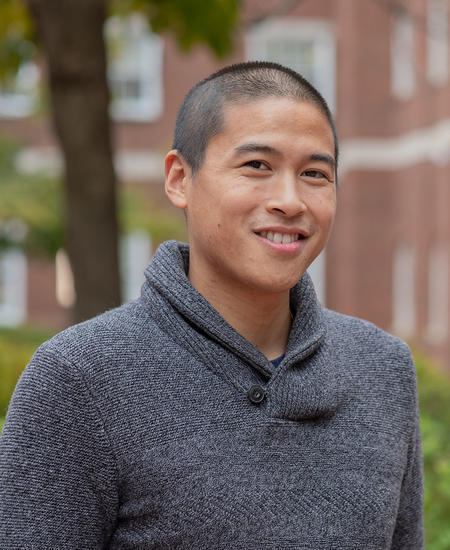Biology Professor Receives Friend of Darwin Award
Jim Krupa, a University of Kentucky professor of biology, recently was honored with the National Center for Science Education Friend of Darwin Award.
Jim Krupa, a University of Kentucky professor of biology, recently was honored with the National Center for Science Education Friend of Darwin Award.
Affiliation: University of South Carolina
Research: www.stefikgroup.com
Abstract: Few aspects are as prevalent and important to energy conversion and storage as the dimension control of porous nanomaterial architectures. The study of nanostructure-dependent electrochemical behavior, however, has been broadly limited by access to well-defined nanomaterials with independent control over the pore and wall dimensions. This historic limitation is partially due to reliance upon dynamic self-assembly processes that progress towards equilibrium. We have developed a kinetically controlled micelle approach as a new nanofabrication tool kit.1-5 Kinetic control is historically difficult to reproduce, a challenge that we have resolved, in part with switchable micelle entrapment6-7 to yield reproducible and homogeneous nanomaterial series that follow model predictions. This approach enables seamless access from meso-to-macroporous materials with unprecedented ~2 Å precision of tuning, commensurate with the underlying atomic dimensions. This precision and independent control of architectures also opens new opportunities for nano-optimized devices.
 Bio: Morgan Stefik obtained a B.E. in Materials Engineering from Cal Poly SLO in 2005 and a Ph.D. in Materials Science from Cornell University in 2010. After postdoctoral research at École Polytechnique Fédérale de Lausanne, he joined the University of South Carolina in 2013 in the Department of Chemistry and Biochemistry. He was awarded an NSF-CAREER in 2018 and is the founding director of the South Carolina SAXS Collaborative. He was highlighted as a “rising star of materials chemistry” by RSC in 2017, was recognized as a Breakthrough Star by USC in 2018, and was elected to the council of the International Mesostructured Materials Association in 2018. Most recently, he was promoted to Associate Professor with tenure in 2019.
Bio: Morgan Stefik obtained a B.E. in Materials Engineering from Cal Poly SLO in 2005 and a Ph.D. in Materials Science from Cornell University in 2010. After postdoctoral research at École Polytechnique Fédérale de Lausanne, he joined the University of South Carolina in 2013 in the Department of Chemistry and Biochemistry. He was awarded an NSF-CAREER in 2018 and is the founding director of the South Carolina SAXS Collaborative. He was highlighted as a “rising star of materials chemistry” by RSC in 2017, was recognized as a Breakthrough Star by USC in 2018, and was elected to the council of the International Mesostructured Materials Association in 2018. Most recently, he was promoted to Associate Professor with tenure in 2019.
 By Ryan Girves
By Ryan Girves
At Saturday’s University of Kentucky basketball game, winners of the Ken Freedman Outstanding Advisor Awards, Beth Hanneman and Erik Myrup, were honored on the court, acknowledging their role in fulfilling the teaching and learning mission of the university.
By Jenny Wells-Hosley

Some of the UK Appalachian Center's 2019 award recipients. Applications for the 2020 James S. Brown Graduate Student Award for Research on Appalachia and for the 2020 UK Appalachian Center Eller & Billings Student Research Award are both due Feb. 17.
By Allison Perry
The University of Kentucky recently received $3 million from the National Institute on Drug Abuse and National Institute on General Medical Sciences to fund new opioid-related research in the criminal justice system.
For all graduate students, professional students, and postdocs who wish to discuss topics related to inclusion and diversity. Lunch provided.
For all graduate students, professional students, and postdocs who wish to discuss topics related to inclusion and diversity. Lunch provided.
Affiliation: University of Kentucky
Research: https://bio.as.uky.edu/users/bohara

Abstract: Sleep is conserved across all birds and mammals, and perhaps all animals, and yet its primary functions and reason for existence are still unclear. We still cannot answer the simple question of why we sleep at all. A major bottleneck in understanding sleep is the time and cost involved with EEG/EMG analysis (the gold standard for sleep in birds and mammals). Therefore, my lab has spent the past twenty years developing a simple, noninvasive alternative using sensitive piezoelectric films, which has allowed for large scale genomic studies, more efficient drug screens, and the testing of sleep in a wide variety of rodent models for human disease. Although we do not know the central functions of sleep very well, we now know that it strongly impacts almost all diseases including infections, cancer, heart disease, diabetes, obesity, Alzhiemer’s, and essentially every disease examined thus far. Sufficient sleep is also critical for optimal performance and our sense of well-being. Even a modest reduction of sleep from 7hrs/night to 5hrs/night reduces the average person’s performance to that of someone who is legally “drunk”. Sleep traits, like almost all traits, are complex, and the specific alleles of specific genes that influence these traits in people and in mice have been difficult to determine. However, we and other labs have begun to find patterns and pathways that may shed light on the most critical processes. Sleep appears to serve many different functions that impact health and disease, a few of which are beginning to be understood, and will be highlighted in this talk.
Abstract: Soft materials are found in a host of application areas, from biotechnology and 3D printing to adhesives and soft devices. However understanding and controlling the behavior of very soft materials is an ongoing challenge. The Soft Materials and Interfaces group focuses on understanding the physics and mechanics of soft polymeric materials, including but not limited to gels, elastomers, and viscoelastic fluids, with an emphasis on responses at or near interfaces. When materials are sufficiently soft or the characteristic size scale is sufficiently small, soft solids display liquid-like characteristics – properties traditionally reserved for liquids emerge as an important part of the material response. In this talk, we introduce situations where combinations of solid and liquid characteristics control the mechanics of deformable interfaces. In particular, we discuss the importance of surface tension, surface stress, and phase separation for the interaction between a small adhesive particle and a soft elastomer. Based on confocal microscopy and colloidal probe experiments, a modified contact mechanics model is proposed. In the second part, we demonstrate tunable adhesive behavior of transient hydrogel networks that are crosslinked with metal-coordination bonds. Time permitting, we will introduce our current knowledge on how a liquid drop interacts with the surface of a soft polymer gel.
 Bio: Jonathan Pham is an Assistant Professor of Materials Engineering at the University of Kentucky. He received a PhD in Polymer Science and Engineering from the University of Massachusetts Amherst where he investigated nanoparticle assembly and mechanics. During this time, he was a Chateaubriand fellow at ESPCI-ParisTech investigating deformation of microscale helical filaments in microfluidics. Prior to joining Kentucky, he was a Humboldt Postdoctoral Fellow at the Max Planck Institute for Polymer Research working on a range of topics, including cell-surface interactions and liquid drop impact.
Bio: Jonathan Pham is an Assistant Professor of Materials Engineering at the University of Kentucky. He received a PhD in Polymer Science and Engineering from the University of Massachusetts Amherst where he investigated nanoparticle assembly and mechanics. During this time, he was a Chateaubriand fellow at ESPCI-ParisTech investigating deformation of microscale helical filaments in microfluidics. Prior to joining Kentucky, he was a Humboldt Postdoctoral Fellow at the Max Planck Institute for Polymer Research working on a range of topics, including cell-surface interactions and liquid drop impact.
Research: http://pham.engineering.uky.edu/team/